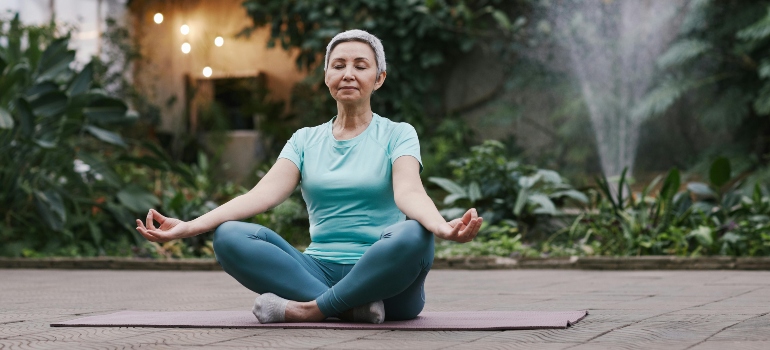Feeling good and satisfied can help people who have struggled with addiction stay on a healthier path without falling back into old habits. We’ll explore why being happy and content with where you are in life can make such a big difference in staying away from substances that harm you. This is a key subject for many families and communities across West Virginia, and understanding the role of life satisfaction in preventing relapse in West Virginia can help us support each other in building stronger, healthier futures.
How Life Satisfaction Impacts Resilience
Life satisfaction is like feeling that you’re in a good place in your life, where you’re happy with how things are going for you. It’s about looking at your life and feeling a sense of contentment and fulfillment from what you have achieved or where you stand, regardless of how big or small those achievements might seem. Now, you might wonder, how does feeling satisfied with your life help you resist the urge to go back to habits you’re trying to leave behind, like substance use? Well, it’s a bit like having a shield made of positive feelings and achievements that helps you stand strong against challenges or temptations that might otherwise knock you down.

When we talk about resilience, we’re talking about your ability to bounce back from tough situations or feelings without letting them drag you back into old, harmful habits. Imagine resilience as a muscle that gets stronger every time you choose healthier ways to cope with anxiety, depression, or any other challenging emotion. Life satisfaction feeds this muscle, making it stronger because when you’re happy with your life, you’re less likely to want to escape from it using substances.
What Are Relapse Triggers?
Triggers are things, people, places, or emotions that can bring back memories of substance use and make you want to use it again. They’re like buttons that, when pressed, can make you feel a strong urge to go back to old habits. These can be as obvious as being around people you used to use substances with or as subtle as a certain smell or sound that reminds you of those times. When you’re satisfied with your life, those buttons become less sensitive. You have more reasons to stay strong because you don’t want to lose the good things you’ve worked hard to achieve.
How to Enhance Life Satisfaction During Addiction Recovery?
Enhancing life satisfaction during addiction recovery involves several key factors that help individuals build a fulfilling and happy life, making it easier to stay on a healthier path. Here are some of them:
- Setting and Achieving Goals: Setting personal goals gives you something to aim for, and achieving them brings a sense of accomplishment. These goals can be as simple as maintaining a healthy routine or improving relationships with family and friends.
- Building Strong Relationships: Having supportive and positive relationships is like having a safety net. Good friends and close family members can offer encouragement, listen when you need to talk, and be there to celebrate your successes.
- Finding Meaningful Activities: Engaging in activities that you find meaningful and enjoyable can fill your life with pleasure and a sense of purpose.
- Practicing Self-Care: Taking care of your physical health through exercise, eating well, and getting enough sleep can improve your overall well-being and satisfaction with life.
- Developing Coping Strategies: Learning healthy ways to cope with stress, anxiety, and negative emotions can prevent you from turning to substances as a way out. Skills like mindfulness, stress management techniques, and going to addiction therapy in WV can be valuable tools.

The Role of Physical Health on Life Satisfaction in Preventing Relapse
Physical health directly impacts how satisfied you feel with your life, especially during recovery from the disease of addiction. Exercise, eating healthy, and getting enough sleep help improve your mood and reduce stress. A body that feels good can support a mind that stays clear and positive. Physical wellness is an important part of building a life where you feel happy and capable of handling challenges.
One of the biggest benefits of physical activity is the release of endorphins, chemicals in your brain that make you feel happier. Regular exercise boosts your energy and helps you sleep better. It can also distract you from negative thoughts, keeping your focus on recovery. Here are some simple ways to boost your physical health during recovery:
- Take daily walks or do light exercises.
- Eat balanced meals with plenty of fruits and vegetables.
- Stick to a sleep schedule, allowing 7-9 hours of rest.
Taking care of your body can increase your overall life satisfaction and make it easier to stay on track.
The Importance of Purpose and Routine in Addiction Recovery
Having a sense of purpose is one of the most powerful ways to feel satisfied with life, especially for those in long term drug rehab WV. When your life has direction and structure, it’s easier to stay focused on recovery. A daily routine can help reduce stress by providing stability. It also gives you something positive to look forward to each day.
Setting goals, whether small or large, can provide a sense of achievement. Goals give your recovery a direction. They keep you motivated and help you build self-confidence. Each time you reach a goal, no matter how small, it reminds you that you are moving forward. Some helpful ways to create a routine in recovery include:
- Setting daily or weekly goals, like exercising or learning a new skill.
- Creating a schedule that balances work, rest, and hobbies.
- Prioritizing time with supportive friends or family members.

With a strong sense of purpose and routine, you can find more happiness in your daily life, which helps prevent relapse.
Community Engagement and Its Impact on Life Satisfaction
Involvement in community activities builds a sense of belonging and purpose, which are important for recovery. When you give your time to something bigger than yourself, it reminds you that you matter. In West Virginia, where some areas are more rural, finding ways to connect with your community can help fight the isolation that often comes with the disease of addiction.
Volunteering or joining a local group can improve your mental health and provide a sense of fulfillment. Whether you’re helping at a food bank or participating in a neighborhood event, these actions strengthen social bonds. They also provide a healthy distraction from triggers. Consider these ways to get involved in your community:
- Join a local club or organization.
- Volunteer at a community center or charity.
- Attend neighborhood events or group meetings.
These connections help you feel part of something meaningful, boosting life satisfaction and supporting long-term recovery.
The Role of Financial Stability in Life Satisfaction
Financial stability is another important factor in how satisfied you feel with your life, especially during recovery from the disease of addiction. Worrying about money can increase stress and create feelings of insecurity, making it harder to focus on staying sober. Having a plan to manage finances can reduce this stress and bring more balance to your life.
Finding stable employment or learning new skills can provide both a steady income and a sense of accomplishment. Even if the job is temporary or part-time, it helps you regain control over your life. Additionally, financial planning—like budgeting—can help you feel more secure in your day-to-day life. Here are a few tips to improve financial stability during recovery:
- Create a budget to track expenses and avoid unnecessary spending.
- Look for job training or educational programs to boost your skills.
- Set small financial goals, like saving a little each month.

By managing finances wisely, you can reduce stress and focus on building a more fulfilling, secure life. Financial stability provides a foundation that supports long-term recovery and overall well-being.
The Challenges to Achieving Life Satisfaction in WV
Achieving life satisfaction in West Virginia, like in many places, comes with its own set of challenges and barriers. The state has faced economic hardships, with job opportunities in traditional industries like coal mining declining, which can make financial stability and finding fulfilling work difficult for many.
Additionally, some areas of West Virginia are quite rural and isolated, limiting access to healthcare and support services, including those for mental health and substance abuse treatment in WV. This can make it harder for individuals to find the help they need when they’re trying to improve their lives and maintain recovery.
Moreover, the social stigma associated with addiction can lead to isolation and discourage people from seeking support, further complicating their journey towards life satisfaction.
Improving Life Satisfaction in Preventing Relapse During Recovery Programs
Recovery programs can adopt a variety of strategies to support individuals on their journey, focusing on both preventing relapse and enhancing life satisfaction by helping their mental health issues, which often accompany addiction.
One effective strategy is relapse prevention training, which teaches individuals to recognize and respond to the early warning signs of relapse. This involves identifying personal triggers, such as specific places, people, or emotions, and developing coping strategies to deal with these triggers without resorting to substance use.

Another strategy involves cognitive behavioral therapy for substance use disorders and mental health issues. CBT helps individuals identify and challenge negative thought patterns and behaviors and replace them with healthier ones. By addressing the underlying thoughts and beliefs that contribute to substance use and depression, CBT can help individuals build resilience and maintain their recovery.
Mindfulness and meditation practices are also increasingly incorporated into rehabs in WV. These practices help individuals stay present and grounded, reducing the impact of stress and negative emotions that can lead to relapse and exacerbate depression. Mindfulness can enhance self-awareness and promote emotional regulation.
Social support is crucial in recovery, so programs often emphasize building and maintaining a supportive network. This can include peer support groups, family therapy for addiction, and community engagement activities. Social connections can provide emotional support, reduce feelings of isolation, and offer positive reinforcement from others who understand the challenges of recovery.
Overcoming Stigma: Improve Life Satisfaction in Preventing Relapse
The stigma surrounding addiction can create feelings of shame or isolation. Unfortunately, this stigma is still present in West Virginia, where many people face barriers to seeking help for the disease of addiction. Relapse rates for substance use disorders range from 40 to 60%. But, overcoming this stigma is possible and necessary for improving life satisfaction. It starts with understanding that addiction is a medical condition, not a moral failure.

Finding support from others who understand your struggles can reduce feelings of loneliness. Peer support groups, family therapy, and community outreach programs can all help. When people begin to see addiction as a disease, they are more likely to offer the support you need to heal. Here are a few ways to fight stigma:
- Educate others about addiction and recovery.
- Join or create supportive groups that offer encouragement.
- Speak openly about your journey to help others understand your experience.
By pushing back against stigma, you open the door to greater acceptance, both from yourself and your community. This, in turn, enhances life satisfaction, making long-term recovery more achievable.
The Massive Role of Life Satisfaction in Preventing Relapse
The role of life satisfaction in preventing relapse in West Virginia is very important. Feeling good about where you are in life and having a sense of fulfillment can act as a strong foundation, helping you face challenges without turning back to old, harmful habits. We’ve talked about how important it is to find joy in activities, build supportive relationships, and learn healthy ways to deal with stress and tough emotions. Recovery programs have a big part to play, too, by teaching skills to manage triggers and depression. While there are challenges in West Virginia, there’s also a strong sense of community and resilience. By focusing on what makes life satisfying and working together, you can build a happier, healthier future.
Reference :



